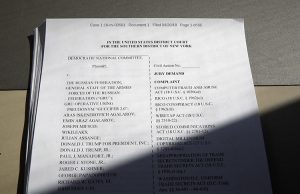AVI ASHER-SCHAPIRO, via press at cpj.org, @AASchapiro
Avi Asher-Schapiro is the Committee to Protect Journalists’ U.S. correspondent. His work has appeared in outlets including The Atlantic, The Intercept, and The New York Times. He just wrote a piece titled “By suing WikiLeaks, DNC could endanger principles of press freedom.”
He writes: “In April, the Democratic National Committee, the governing body of the Democratic Party, announced that it was suing WikiLeaks and Julian Assange — along with a number of other defendants, including the Trump campaign and Russian operatives — for their alleged involvement in the theft and dissemination of DNC computer files during the 2016 election. On its surface, the DNC’s argument seems to fly in the face of the Supreme Court’s precedent in Bartnicki v. Vopper that publishers are not responsible for the illegal acts of their sources. It also goes against press freedom precedents going back to the Pentagon Papers and contains arguments that could make it more difficult for reporters to do their jobs or that foreign governments could use against U.S. journalists working abroad, First Amendment experts told CPJ. …
“The notion that journalistic activity such as cultivating sources and receiving illegally obtained documents could be construed as part of a criminal conspiracy is, according to [The New York Times‘ Pentagon Papers lawyer James] Goodale, the ‘greatest threat to press freedom today.’ …
“The case raises a number of important press freedom questions: Where should courts draw the line between source-building and ‘conspiring’? What activities could implicate a journalist in a source’s illegal behavior? Would putting a SecureDrop link soliciting leaks count as illegal conspiracy? And if a reporter asked for documents on an individual while indicating that they think the person deserves to be exposed, would that count as shared motive, or is the only truly protected activity passively receiving leaks, like radio host Vopper? …”Many of the legal experts said they assume the counts that mention Assange and WikiLeaks will be dismissed when the judge assesses if the conspiracy claims in the DNC lawsuit are ‘plausible.’ If the judge moves forward, University of Texas law professor Steve Vladeck said, it will be because he finds a way to substantially differentiate what WikiLeaks does from routine reporting practices.
“However, Charles Glasser, a professor at NYU’s journalism school who spent over a dozen years as global media counsel for Bloomberg, said that if the charges against Assange and WikiLeaks survived, it could pave the way for companies or others to label everyone — from those who illegally obtain documents to the press — as co-conspirators.”
